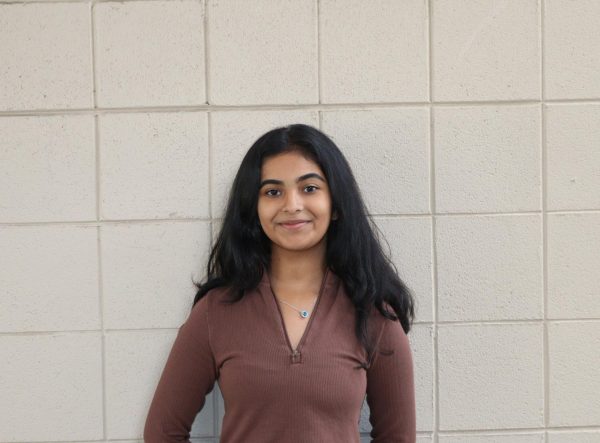It’s a typical day in Biology teacher Lisa Cochrum’s classroom. She stands on her desk, beckoning her students to also stand up.
“It’s made of C, H and O,” Cochrum sings, mirroring her words with movements reminiscent of “Itsy Bitsy Spider.” The dance follows a memorization method called Total Physical Response (TPR), which links physical movement to verbal input.
Cochrum has relied on demonstrative, humor-infused teaching strategies since she began working here in 1993 — a method that has made her beloved among students and contributed to her being voted District Teacher of the Year in 2011 by her colleagues.
Senior Apollo Burgess looks back on his freshmen Earth Science class fondly, citing her methods as the reason he retains course content today.
“I may not have been the best at getting work done, but I always did well on tests because of her one-on-one help,” Burgess said. “Her enthusiastic approach always made class fun and didn’t make it feel like learning.”
Shift in schools leads to struggles
Growing up in Millbrae, a city northeast of the San Francisco International Airport, Cochrum said she was on the lower end of the reading level in early elementary school but did not stick as having a learning disability.
In fourth grade, she moved to Palo Alto when her mom got a job as a special education resource teacher at Palo Alto High. Suddenly, Cochrum found herself in an unfamiliar, academically competitive culture.
“I was learning alongside doctors’, lawyers’ and engineers’ kids. And now I wasn’t just in the bottom reading group, I was the bottom kid by a far shot,” she said.
Testing revealed she had high intelligence but low functionality — the classic definition of a learning disability. Her diagnosis included difficulties with language acquisition, auditory learning and math. By the end of fourth grade, she was two grade levels below in both math and reading.
Cochrum remembers one instance in fourth grade when she had a book report due on a Monday. She wanted to attend a birthday party that weekend. Her mom agreed as long as she studied on Sunday.
However, Cochrum didn’t start working on the report until late Sunday night. Her mom made her turn in a half-finished paper, which she received a D on. The experience was humbling, and it was a lesson she would carry with her for the rest of her life.
“It was good to learn at 10, not at 14, that there are consequences if I don’t work twice as hard as everybody else,” Cochrum said. “The sooner you learn that lesson, the better.”
Cochrum received a lot of outside academic help during this period, which allowed her to catch up and learn alongside her peers. Science came easily to her, but she began working with tutors three times a week on Algebra 2 and Spanish. By the time she reached junior high, she was caught up to the grade-level standard.
In high school, Cochrum continued to face challenges as a special education student. She found Spanish particularly difficult as the only senior in a class of freshmen. During her fall final, she remembers breaking down in tears during her test. Her teacher, a Stanford-educated “no-nonsense” woman, brought her a Kleenex and told her to complete it.
Throughout this challenging time, Cochrum relied on her mother as a grounding force.
“My mom kept my IQ chart taped to our refrigerator,” Cochrum said. “Anytime I would come home discouraged, she would say: ‘What’s your IQ?’ I would read the number. She would say: ‘Are you capable?’ I would answer: ‘Yes.’ She would then ask: ‘Do we have to figure out a way to get you the help you need so you can do what you want?’ I would say, ‘Yes.’”
It wasn’t only her mother who reframed her perspective on special education. Her father, a doctor who also had a learning disability, was a successful researcher who made a breakthrough in kidney transplants during his career.
“It made him an out-of-the-box, creative thinker,” she said about his learning disability. “It made my dad a better doctor, and it certainly has made me a better teacher.”
By the time she began studying Biology at Westmont College, she had learned to advocate for herself and seek accommodations for her learning disability. She requested extended time on tests, had tutoring multiple times a week and asked teachers to receive assignments early so that she had more time to complete them.
She recalls entering graduate school at Stanford in 1989 with an Individualized Education Plan (IEP). The university granted Cochrum every necessary accommodation while she pursued her Master’s in Education, including an additional year to complete her thesis.
Cochrum notes that modern technology proved invaluable in navigating the more challenging aspects of life for those with learning differences. She recalls missing birthday parties because she drove in the wrong direction earlier in life.
Then came GPS, which solved her problems following directions. Similarly, expressing herself in writing used to be a struggle. She believes that spellcheck and text-to-speech tools have “saved her life” when it comes to the written word.
In her decades-long career, Cochrum’s own experiences have greatly informed how she tries to reach every student in classes. She encourages her students, especially those with learning disabilities, to advocate for themselves.
“There is no shame in saying” ‘I’m diabetic and need insulin,’ just as there is no shame in saying: ‘I have a learning disability and need academic help,’” Cochrum said.

























